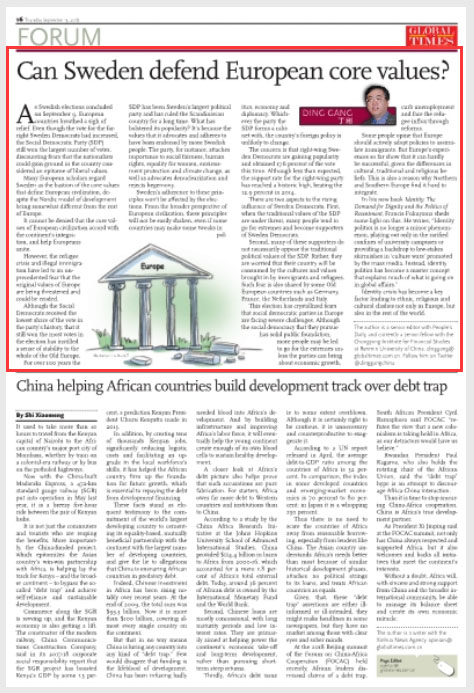Major Power Relations
Your Present Location: PROGRAMS> Major Power RelationsDing Gang: Can Sweden defend European core values?
By Ding Gang Source: Global Times Published: 2018-9-12
As Swedish elections concluded on September 9, European countries breathed a sigh of relief. Even though the vote for the far-right Sweden Democrats had increased, the Social Democratic Party (SDP) still won the largest number of votes, discounting fears that the nationalists could gain ground in the country considered an epitome of liberal values.

Many European scholars regard Sweden as the bastion of the core values that define European civilization, despite the Nordic model of development being somewhat different from the rest of Europe.
It cannot be denied that the core values of European civilization accord with the continent's integration, and help Europeans unite.
However, the refugee crisis and illegal immigration have led to an unprecedented fear that the original values of Europe are being threatened and could be eroded.
Although the Social Democrats received the lowest share of the vote in the party's history, that it still won the most votes in the election has instilled a sense of stability to the whole of the Old Europe.
For over 100 years the SDP has been Sweden's largest political party and has ruled the Scandinavian country for a long time. What has bolstered its popularity? It's because the values that it advocates and adheres to have been endorsed by more Swedish people. The party, for instance, attaches importance to social fairness, human rights, equality for women, environment protection and climate change, as well as advocates denuclearization and rejects hegemony.
Sweden's adherence to these principles won't be affected by the elections. From the broader perspective of European civilization, these principles will not be easily shaken, even if some countries may make some tweaks in politics, economy and diplomacy. Whichever the party the SDP forms a cabinet with, the country's foreign policy is unlikely to change.
The concern is that right-wing Sweden Democrats are gaining popularity and obtained 17.6 percent of the vote this time. Although less than expected, the support rate for the right-wing party has reached a historic high, beating the 12.9 percent in 2014.
There are two aspects to the rising influence of Sweden Democrats. First, when the traditional values of the SDP are under threat, many people tend to go for extremes and become supporters of Sweden Democrats.
Second, many of these supporters do not necessarily oppose the traditional political values of the SDP. Rather, they are worried that their country will be consumed by the cultures and values brought in by immigrants and refugees. Such fear is also shared by some Old European countries such as Germany, France, the Netherlands and Italy.
This election has crystallized fears that social democratic parties in Europe are facing severe challenges. Although the social democracy that they pursue has solid public foundation, more people may be led to go for the extremes unless the parties can bring about economic growth, curb unemployment and face the refugee influx through reforms.
Some people opine that Europe should actively adopt policies to assimilate immigrants. But Europe's experiences so far show that it can hardly be successful, given the differences in cultural, traditional and religious beliefs. This is also a reason why Northern and Southern Europe find it hard to integrate.
In his new book Identity: The Demand for Dignity and the Politics of Resentment, Francis Fukuyama sheds some light on this. He writes, "Identity politics is no longer a minor phenomenon, playing out only in the rarified confines of university campuses or providing a backdrop to low-stakes skirmishes in 'culture wars' promoted by the mass media. Instead, identity politics has become a master concept that explains much of what is going on in global affairs."
Identity crisis has become a key factor leading to ethnic, religious and cultural clashes not only in Europe, but also in the rest of the world.
The author is a senior fellow with the Chongyang Institute for Financial Studies at Renmin University of China.























































































 京公网安备 11010802037854号
京公网安备 11010802037854号





